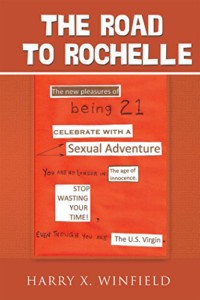Title: The Road to Rochelle
Author: Harry X. Winfield
Publisher: Authorhouse
ISBN: 9781524642303
Pages: 384
Genre: Biographical Novel
Reviewed by: Dan Macintosh
Pacific Book Review
Harry X. Winfield’s story, The Road to Rochelle, opens the reader up to a few fascinating questions. The focus of Winfield’s life story involves the rekindling of an old college flame. This relighting, however, is not some 40-ish midlife crisis; similar to the ones we’ve become all too familiar with in Hollywood movies. We all know the cinematic stereotype where a man reaches 40 and wonders about what he’s become. Did he choose the right career? Was he, or was he not, satisfied with his life? Had he married the right woman? Is he the person he’d dreamed he’d become as a young child? If not, a man buys a sports car, shares his time with a younger woman with whom he’s also having an affair and proceeds to sow any unused wild oats still left over from his youth.
In contrast, the main character Eddie Hughes is retired at 65, which is well beyond the typical midlife crisis years and one who would rather focus his free time on building a model railroad than speeding through town in a high-powered red sports car. However, sex – both the satisfying and the dangerous variety – are central to Hughes’ story. On the positive side, Hughes’ ex (referred to throughout as GV) was the woman who helped him discover the true pleasures of sexual intercourse back when they were in college. On the negative side, though, Hughes was sexually molested as a young boy scout by a trusted scoutmaster, leaving him with some damaged personality traits.
The sex Hughes had with GV was so good, in fact, these memories drive him to want to reconnect with his college sweetheart. Hooking up with a fellow college student, while still in college, is relatively uncomplicated. Uncomplicated, that is, when compared with doing it some 40 years later; being a father who is happily married and expressing interest in another happily married woman. Such interest jeopardizes two marriages and threatens to damage the balance of two extended families, not to mention the relationships of friends and acquaintances. Hughes reaches out to GV under the pretense of doing research for his autobiography, but it doesn’t end there.
Winfield begins telling his story with a relatively straightforward narrative, before switching to the unusual and innovative email copy approach. Winfield switches up how he tells this story by including what looks like valid email exchanges among the book’s main characters. The Hughes character chooses these email exchanges because they’re relatively less harmful than calling or actually visiting this woman from his past life.
What makes Winfield’s story so compelling is how it tracks initially innocent exchanges between Hughes and GV, which evolve into uncomfortable typed conversations. At first, GV is supportive of Hughes’ decision to exorcise the demons of his past. She’s also gratified to know she was instrumental in Hughes’ sexual breakthrough. However, she becomes more uncomfortable once Hughes begins to suggest his intentions go well beyond mere research. Once Hughes suggests he and GV plan a time to spend time together – physically, not just in cyberspace – she begins to resist.
The tension, which contrasts Hughes’ growing desire with GV’s cooling toward her past friend, is what drives the plot in this story and the arc where the book fully catches fire. Where Winfield’s story sometimes falls a little short, though, is with the overly literal manner he tells this story. Rather than embellishing his story with the sort of prose that creates vivid character portrayals, he simply and straightforwardly relays their conversations. This approach, which is oftentimes perfectly suitable for news journalism, can leave fiction more than a little dry.
Although more descriptive language would have made Winfield’s book a much easier and enjoyable read, the story he tells is still very compelling, it’s a tough book to put down – particularly toward the end. The Road to Rochelle highlights the truth of how unrequited love is painful, whether it involves the young or the old. Perhaps this can be a beacon of a story for guiding younger readers away from such a potential pitfalls in their lives, as Winfield’s recounts can certainly and effectively squelch the latent feelings in readers who may have had a similar friend in their college days.



Follow Us